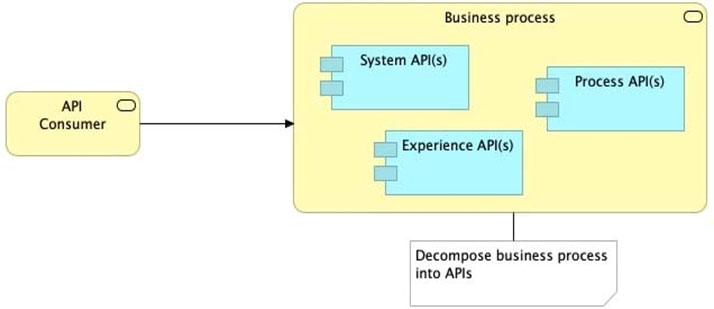MuleSoft MCPA - Level 1 Exam Practice Questions (P. 5)
- Full Access (58 questions)
- One Year of Premium Access
- Access to one million comments
- Seamless ChatGPT Integration
- Ability to download PDF files
- Anki Flashcard files for revision
- No Captcha & No AdSense
- Advanced Exam Configuration
Question #21
When using CloudHub with the Shared Load Balancer, what is managed EXCLUSIVELY by the API implementation (the Mule application) and NOT by Anypoint
Platform?
Platform?
- AThe assignment of each HTTP request to a particular CloudHub worker
- BThe logging configuration that enables log entries to be visible in Runtime Manager
- CThe SSL certificates used by the API implementation to expose HTTPS endpointsMost Voted
- DThe number of DNS entries allocated to the API implementation
Correct Answer:
A
A
send
light_mode
delete
Question #22
Refer to the exhibit.

What is the best way to decompose one end-to-end business process into a collaboration of Experience, Process, and of System APIs?

What is the best way to decompose one end-to-end business process into a collaboration of Experience, Process, and of System APIs?
- AHandle customizations for the end-user application at the Process API level rather than the Experience API level.

- BAllow System APIs to return data that is NOT currently required by the identified Process or Experience APIs.
 Most Voted
Most Voted - CAlways use a tiered approach by creating exactly one API for each of the 3 layers (Experience, Process and System APIs).

- DUse a Process API to orchestrate calls to multiple System APIs, but NOT to other Process APIs.

Correct Answer:
C
C
send
light_mode
delete
Question #23
What is true about where an API policy is defined in Anypoint Platform and how it is then applied to API instances?
- AThe API policy is defined in Runtime Manager as part of the API deployment to a Mule runtime, and then ONLY applied to the specific API instance.
- BThe API policy is defined in API Manager for a specific API instance, and then ONLY applied to the specific API instance.Most Voted
- CThe API policy is defined in API Manager and then automatically applied to ALL API instances.
- DThe API policy is defined in API Manager, and then applied to ALL API instances in the specified environment.
Correct Answer:
B
B
send
light_mode
delete
Question #24
An API implementation is deployed to CloudHub.
What conditions can be alerted on using the default Anypoint Platform functionality, where the alert conditions depend on the end-to-end request processing of the
API implementation?
What conditions can be alerted on using the default Anypoint Platform functionality, where the alert conditions depend on the end-to-end request processing of the
API implementation?
- AWhen the API is invoked by an unrecognized API client
- BWhen a particular API client invokes the API too often within a given time period
- CWhen the response time of API invocations exceeds a thresholdMost Voted
- DWhen the API receives a very high number of API invocations
Correct Answer:
C
Reference:
https://docs.mulesoft.com/api-manager/2.x/using-api-alerts
C
Reference:
https://docs.mulesoft.com/api-manager/2.x/using-api-alerts
send
light_mode
delete
Question #25
A Mule application exposes an HTTPS endpoint and is deployed to the CloudHub Shared Worker Cloud. All traffic to that Mule application must stay inside the
AWS VPC.
To what TCP port do API invocations to that Mule application need to be sent?
AWS VPC.
To what TCP port do API invocations to that Mule application need to be sent?
- A443Most Voted
- B8081
- C8091
- D8092
Correct Answer:
D
Reference:
https://help.mulesoft.com/s/question/0D52T00004mXXULSA4/multiple-http-listerners-on-cloudhub-one-with-port-9090
D
Reference:
https://help.mulesoft.com/s/question/0D52T00004mXXULSA4/multiple-http-listerners-on-cloudhub-one-with-port-9090
send
light_mode
delete
All Pages
